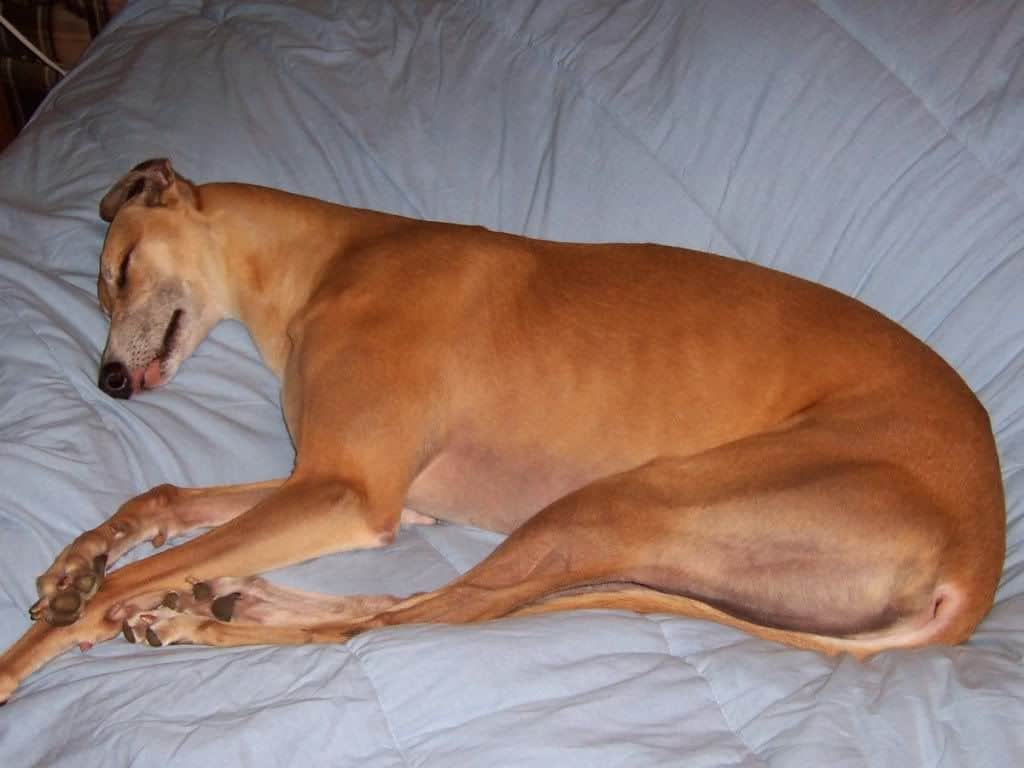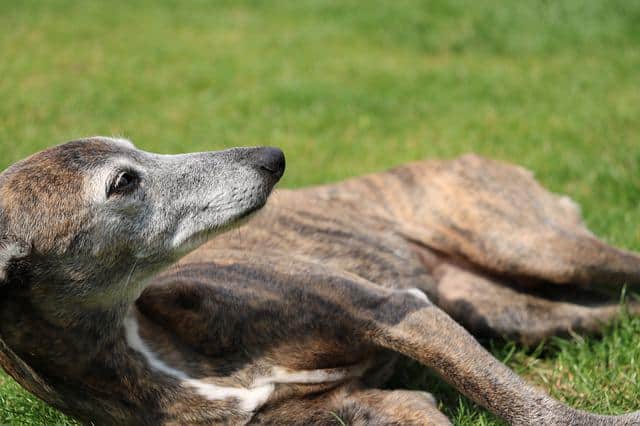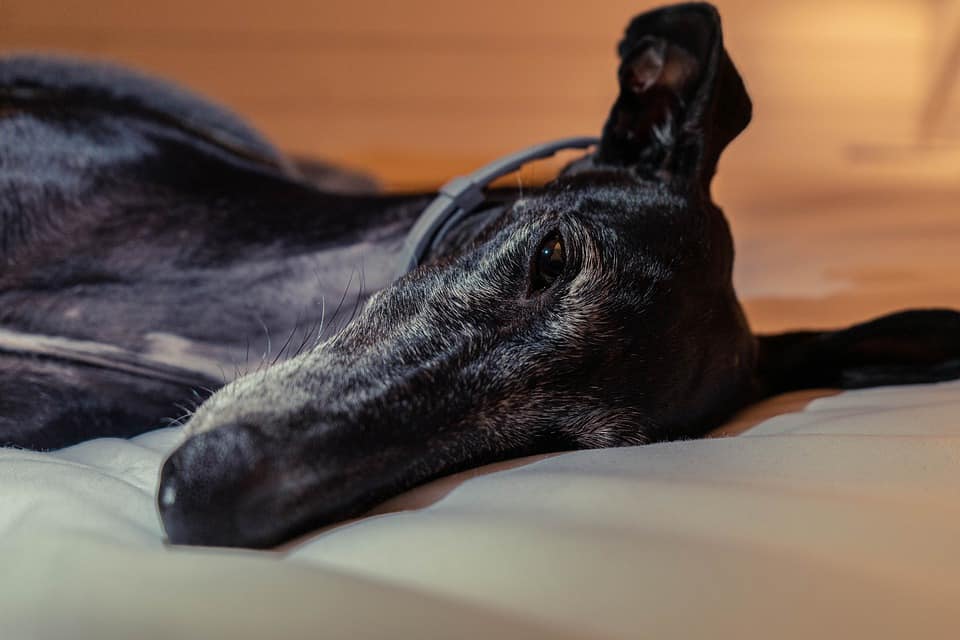When I adopted our first Greyhound I was in my 40’s and I remember wondering if I would have enough energy to keep up with a Greyhound. There was no way I could possible have the energy to keep up with a Greyhound that can run like a cheetah, right?
But little did I know I was adopting a dog that could literally sleep all day and night and sometimes be very hard to wake up!
Sometimes I feel like this is me trying to wake up my Greyhound….
But then I started to wonder why do Greyhounds sleep so much? Is there something genetic that makes a Greyhound sleep so much?
Is it because they ran so many races down in those Alabama and Florida dog racing tracks that they’ve decided to take the rest of life as a big long vacation day?
Maybe there’s something wrong with her, maybe she’s sick.
So many things ran though my head. So let me tell you what I found out and help you understand why your Greyhound sleeps as much as mine does.
Table of Contents
How Many Hours Do Greyhounds Sleep?
One of the things I found out is that Greyhounds are really no different from other dogs. They all love to sleep.
There are many studies out there that show most dogs will sleep 10-12 hours every day. But there was something telling me that Brittany (our Grey) had to be sleeping WAY more than that. She literally lays around sleeping ALL DAY.
So I started looking into this a bit more and found out that, although I thought Brittany was deep sleeping all day, she’s really not in a complete state of Rapid Eye Movement (REM) sleep for that entire time. And this is totally normal.
And actually, she’s probably only in REM sleep about 10% of that time, which is somewhat less than humans which are in REM about 20-25% of their sleep time.
REM sleep is important for dogs because it promotes a healthy brain, stimulates the brain in many good ways and is just very good for a dog’s overall good health.
I can tell when Brittany is in REM sleep and I’ll bet you would know too if you saw her. Normally she’s laying on her back, feet up in the air (you Greyhound people know what I’m talking about too!). She’ll usually start breathing heavy, moving her legs like she’s running and make ‘crying’ type noises or growls.
I always used to wake her up when she would do this as I felt like it wasn’t normal. Come to find out this is that deep REM sleep that is really super healthy for her and I should just let her be.
How Long Do Greyhounds Sleep?
Greyhounds only sleep 10-12 hours in a 24-hour period on average. Because Greyhounds only spend about 10% of their sleep time in deep REM, the rest of their sleep time is irregular which requires more total sleep time. That explains to a degree why Greyhounds seem to be laying around ‘sleeping’ so much during the day.
Is Your Greyhound Sleeping Too Much?
As with humans, every Greyhound is different and that goes for sleep patterns too.
My experience with our two Greyhounds has been quite similar though. They lay around a lot and they tend to sleep quite a bit every day. But I don’t think the sleeping is excessive by no means.
Because we do our best to ensure our Greys get lots of exercise, we understand they will want to sleep quite a bit the rest of the day. It’s just their nature and I’m fine with it.
When we talk with people and they find out we have a Greyhound, they have immediate thoughts of high energy fast racing dogs that take up a lot of time to keep them in shape. They envision lots of walks and a dog that is high maintenance when it comes to time and effort to take care of them.
That couldn’t be less true.
You will find that Greyhounds are a very chill breed and they’re way more lazy than you would think. Laying around for 18 hours or 20 hours a day is probably not uncommon.
Yes, Greyhounds have spurts of energy that would amaze you, but they’re definitely not marathon runners. They are the Usain Bolt of the dog world, built for speed over short distances. They are not long distance endurance runners by no means.
So do not be alarmed when your Greyhound is sleeping all hours of the day. Most of the time they’re half asleep, half awake anyways.
If they’re laying around or sleeping for most of the day, it’s definitely normal. Come by our home and watch Brittany for a day….in the dictionary next to “lazy bones” there’s a picture of her!
Things to be Aware of if your Greyhound’s Sleeping Patterns Change
I tend to treat my dogs like my kids so I’m pretty in-tune with what is normal behavior and what is odd or cause for concern. Because of that, I’m also in-tune with their sleeping patterns.
There are a number of things related to your Greyhound’s sleeping patterns that could be the cause of some concern. Let’s go over a few things you should look for.
1. Your Greyhound has a hard time waking up. – Now as dogs get older, they certainly can have a tougher time getting out of bed in the morning. Much like adults, as they age it just becomes more of a chore to jump out of bed. Age could certainly have a lot to do with it, but if you start noticing that it’s becoming really hard to get your Greyhound out of bed for breakfast in the morning, you may want to advise your Veterinarian.
2. Your Greyhound’s sleeping is interfering with eating patterns. – My Greyhound Brittany must have an Apple Watch on her somewhere because when 4:30pm hits, she’s wide awake and ready to eat dinner. I’ve never known Brittany to not be ready for dinner in that timeframe. However, if she were sleeping right through that dinner window and not bugging me, I would definitely be concerned that there could be a bigger problem. I’m not one to speculate, but anytime there is something messing with normal hunger and meals, it would worry me. Enough to notify the Vet for sure.
3. Your Greyhound wakes up suddenly like she was spooked or frightened. – I’ve never known Brittany to jump out of bed from a dead sleep like she was frightened EXCEPT if there was a loud noise like fireworks or thunder. But if she did wake up suddenly without a noticeable reason, it might alarm me. It certainly could be a nervous reaction to a dream while she’s in REM sleep or even a biting insect. Maybe even a muscle spasm that made her uncomfortable. There are a number of reasons why your Greyhound suddenly woke up that are not all bad so just know that it could happen.
4. Your Greyhound’s excessive sleep is causing aggression related issues. – If your Greyhound is normally very easy going and you start to notice changes in sleep patterns accompanied by some unusual aggression, that would concern me for sure. If behavior like that is unusual, again my first call is to my Vet to have your dog checked out for any serious ailments.
5. Your Greyhound isn’t sleeping as much as normal. – If you find the opposite issue where your Greyhound stays up more often than normal, that also could be an issue. Sometimes pain or brain related issues will cause a dog to not sleep or you’ll even see other physical reactions like panting, drooling or even pacing instead of sleeping. All of these are cause for concern. Don’t speculate and Google all the symptoms looking through fifty different scary possibilities…..call your Vet for professional help.
Some Final Thoughts on Why Greyhounds Sleep So Much
If you’re a new Greyhound Mom or Dad, just understand that it is definitely not unusual for your Greyhound to sleep quite often throughout the day.
They definitely need a lot of exercise so make sure you’re taking them on walks and letting them do their Greyhound zoomies to wear them out. But when they come back inside, it is totally normal for them to cuddle up somewhere for a lot of sleepy time.
As you get to know your Greyhound you’ll get to know their tendencies and you will quickly understand what is usual and what is unusual when it comes to sleeping. In my house, Brittany will be dozing 90% of the time I see her so it’s definitely not unusual.
And for what it’s worth, I think Brittany probably had a tough early life on the track so I’m content to let her sleep as much as she wants. If she’s fine, so am I.
If you have any questions about your Greyhound’s sleep related issues and you want to run them by me, please don’t hesitate to reach out. I’d be glad to help if I can. Take care.




